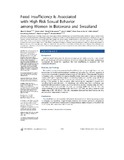| dc.description.abstract | Background: Both food insufficiency and HIV infection are major public health problems in sub-Saharan
Africa, yet the impact of food insufficiency on HIV risk behavior has not been systematically
investigated. We tested the hypothesis that food insufficiency is associated with HIV
transmission behavior.
Methods and Findings:
We studied the association between food insufficiency (not having enough food to eat over
the previous 12 months) and inconsistent condom use, sex exchange, and other measures of
risky sex in a cross-sectional population-based study of 1,255 adults in Botswana and 796 adults
in Swaziland using a stratified two-stage probability design. Associations were examined using
multivariable logistic regression analyses, clustered by country and stratified by gender. Food
insufficiency was reported by 32% of women and 22% of men over the previous 12 months.
Among 1,050 women in both countries, after controlling for respondent characteristics
including income and education, HIV knowledge, and alcohol use, food insufficiency was
associated with inconsistent condom use with a nonprimary partner (adjusted odds ratio [AOR]
1.73, 95% confidence interval [CI] 1.27–2.36), sex exchange (AOR 1.84, 95% CI 1.74–1.93),
intergenerational sexual relationships (AOR 1.46, 95% CI 1.03–2.08), and lack of control in sexual
relationships (AOR 1.68, 95% CI 1.24–2.28). Associations between food insufficiency and risky
sex were much attenuated among men.
Conclusions:
Food insufficiency is an important risk factor for increased sexual risk-taking among women
in Botswana and Swaziland. Targeted food assistance and income generation programs in
conjunction with efforts to enhance women’s leg | en_US |

